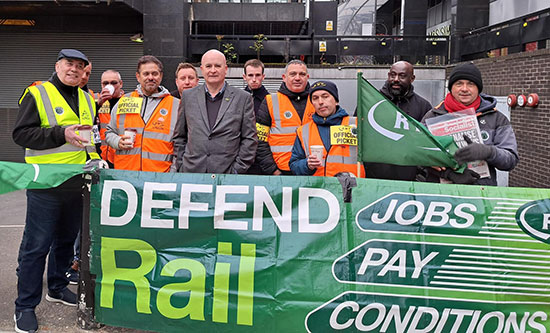
Though the wave of strikes that started in summer 2022 has continued through spring, there is as yet no sign that the tight control exercised by trade union leaders over their conduct is being significantly challenged. Although members of the Royal College of Nursing rejected the NHS offer, the balloting process for a new round of strikes after the end of the previous six-month mandate required by anti-trade union laws will take a month to complete. Long drawn-out campaigns by educational and university unions are designed to ensure that the campaigns of industrial action do not lead to significant unrest. The Enough is Enough campaign set up by trade union leaders and left Labour MPs last autumn has already disappeared.
Speaking to The Times, Pat Cullen, Chief Executive of the Royal College of Nursing (RCN), was forced to admit that ‘she may personally have underestimated’ RCN members and their ‘sheer determination’ in rejecting the pay offer the RCN leadership had recommended of a mere 5%. She now says that the minimum basis for any further negotiations with the government should be a pay offer in ‘double figures’ but this could still fall short of the 19% demanded last year. The next strike ballot opened on 23 May and will last one month, with the union seeking a mandate to strike across England rather than just individual trusts. If the 50% turnout threshold is met and the majority vote to strike, the union will have a mandate to strike in every hospital in England.
However evidence of a determination to dig in and fight appears, at the moment, to be limited to certain sections of the RCN and Unite membership, with the largest health union Unison, alongside the Royal College of Midwives, Chartered Society of Physiotherapy, GMB, the British Orthoptic Society, and the British Association of Occupational Therapists all voting to accept the 5% pay deal. Meanwhile, junior doctors in England staged strikes for five days in April. The British Medical Association (BMA) is demanding a 35% pay rise to reverse the real terms pay cuts that began in 2008. After three weeks of talks during which the only offer was a miserable 5%, the BMA announced a three-day walk-out for June and further strike action during the summer. Junior doctors have been offered 14.5% in Scotland.
Strikes have also taken place across the education sector with unions demanding an above inflation pay rise that is not drawn from existing education budgets. Members of the National Education Union (NEU) have staged three regional and five national walk-outs since the beginning of the year. After negotiations, the government announced a one-off payment of £1,000 and a pay rise of 4.3%, with starting salaries rising to £30,000. However, the four unions involved in the dispute rejected the offer. As we go to press, the NEU is now ‘considering’ further industrial action in the summer term and teachers in the NASUWT and members of the National Association of Head teachers are also balloting for strike action.
In a dispute over pay with the Rail Delivery Group the RMT announced a one-day strike in May, coinciding with the Eurovision final, and another single strike day on 2 June affecting 20,000 railway workers. ASLEF announced its members would walk out for two days in May and again on 3 June, the day of the FA cup final. The University and College Union leadership has also been ensuring that strike action over their pay demand is limited in frequency and duration, focusing instead on a boycott of marking and assessment.
In August 2022 the Enough is Enough campaign was launched with a slick video featuring Dave Ward, General Secretary of the Communication Workers Union, Zara Sultana, Labour MP for Coventry South and Mick Lynch, Secretary-General of the RMT. The campaign was supposed to build support for the current wave of strikes and mobilise ‘resistance’ to austerity and the ‘cost of living crisis’. The campaign’s demands included a ‘real’ pay rise; the ‘slashing’ of energy bills; an end to food poverty; ‘decent’ homes for all and a demand to ‘tax the rich’. The last event advertised on its website was in January: it was never meant to be a serious proposition, and it involves little more than a weekly tweet.
The message is clear: the trade union leadership are not prepared to allow strike actions get out of hand. Enough is Enough was to serve as a safety valve for those who might want to take some kind of political action. It has proved unnecessary: there is still a long way to go before the strike actions lead to any broader class consciousness. For the millions of workers outside of the trade unions on poverty pay and in precarious conditions there is still no representation for their interests. Working class resistance remains suffocated by the dead hand of the labour movement leadership.
Ellie Mack
FIGHT RACISM! FIGHT IMPERIALISM! 294 June/July 2023




